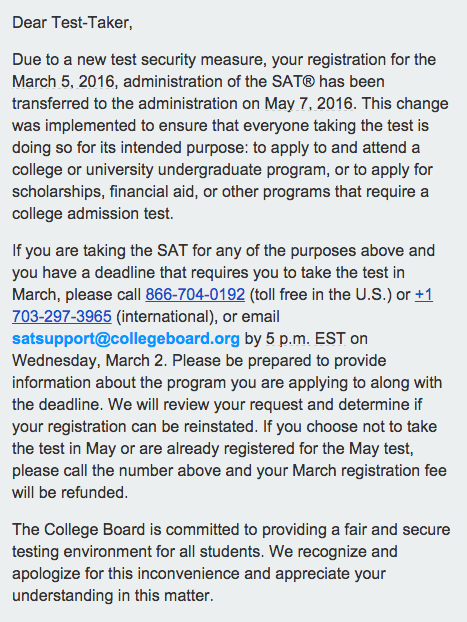Blacklisted

In a last-minute and blatantly transparent move to keep the content of the New SAT under wraps, the College Board has blacklisted all non-student registrants from taking Saturday's SAT, the first administration of the new test.
This decision came to light because I and two of my colleagues at Method Test Prep had been registered (since January) to take the March SAT. Then, on Monday, only five (five!) days before the exam, we received this buzzkill:
So we’ve been relegated to the May test. Before I get into how spectacularly dirty a move this was, let me address a few questions you might have.
You can take the SAT? Yup. I've done so four times without incident since joining Method Test Prep in 2010, as have many of my colleagues.
Why do you take the SAT? I and my colleagues take the SAT to further understand the content and structure of the exam, that we might better communicate both to our students. Because there is nothing quite like taking a real SAT in a real testing environment, sitting in a real classroom on a real test day just as students do is the best way for us not only to gain further insight into the exam’s content, but also to see how the exam feels. How do the breaks really work? What pressures will you experience? How will your stamina hold up? The better we understand these elements, the better we can prepare our students to perform their best on the SAT.
Gimme a break: you're just trying to see the questions, right? We are definitely trying to see the questions. (Note: we do not “steal” questions by writing them down on secret pieces of paper or by taking illicit photos of test materials — we leave the test only with what is in our heads. We never improperly relay test material to students taking the same exam.) Straight content, however, is not our only motivation by a long shot. In addition to what was discussed above, we are looking to gain insight into an entirely new exam, for which only four official practice tests have been published. Is the balance of questions in these practice exams true to that of the real test? Are the language and format the same? We can't answer either question if we can't see the real thing. Something else: we also take the test to keep our own skills sharp. There's nothing like a timed test under pressure to keep us on our toes: as proud nerds, we relish the intellectual challenge of the SAT.
Now to the fun part. Let’s see why this really is an outrageous move.
The timeline. The College Board knew the New SAT was coming. It knew people like me would register to take the test. It has had years to ensure its test materials remain secure. And yet, in its letter to us disqualified few, the College Board cited a “new test security measure” as the prime motivator for shifting our registrations. Forgive me if I'm a bit dubious that any “new measure” exists. Even after suffering a string of highly publicized domestic and international cheating incidents over the last five years, the College Board has done little to prevent test-day shenanigans. When I last sat for an SAT in 2013, I was subjected to the same low-level half-scrutiny of my ID and test admission ticket that was used in 2004, when I took the SAT as a student. It's very hard to believe that any serious security changes have been implemented, no less five days before the test. I have to say, though, that the College Board is staying true to form here: delays and missed deadlines on its PSAT score rollout (and on many other things related to the New SAT) suggest a lack of time-management skills on the part of the shot-callers, and it's no different here.
The inconsistency of the rationale. Later in the first paragraph of its note, the College Board says that it wants to ensure all who are taking the test are doing so in the spirit of the test’s “intended purpose”—that is, to gain admission into post-secondary institutions. So which is it? Are we being more secure, or are we just saying non-students can't take the test? Those aren't equal statements. I'd prefer the College Board pick one and stick with it.
The conflict between messaging and behavior. The New SAT is supposed to have been all about “transparency”. That very word was used 12 times in the College Board’s New SAT Highlighted (its debut document about the New SAT). The College Board even held a “Transparency Summit” back in December. But now, my cohorts and I are being shut out. The College Board might argue that it has been sufficiently transparent in its release of resources, its publication of four official exams, etc. Again, it is essential that we confirm that the actual test aligns with the practice ones, especially because the College Board has repeatedly used the disclaimer that any of the test specifications it initially proposed (number of questions, section length) were “subject to change”. Now, we won’t know whether anything has indeed changed until May.
How we know all this is nonsense. If this were all really about “security”, the College Board could instruct schools to segregate non-high-school-age testers (both physically during the test and statistically in the score-scaling process) from the students taking the exam. What this is really about, however, is propriety. Plainly and simply, the College Board doesn't want us seeing its test. It is afraid we’ll be able to use what we see (and the subsequent insights) to help students “defeat” the exam. This is strange, since the College Board maintains that prep courses, tutoring, and the like are ineffective at improving students’ scores. So what are the folks at the College Board afraid of? The irony abounds.
Suppose the College Board were to finally come out and admit that, yes, the SAT is a “beatable” test, and that, yes, allowing non-students to take the exam compromises its ability to administer a “fair” standardized test. Marvelous — ban all non-students from taking the SAT! Sure, I'd be disappointed, but I'd understand. The move we just experienced, however, is a heavy-handed and capricious attempt at obscuring the test.
And so goes another farcical move by the College Board. For the sake of students taking the exam, let’s hope the absurdity stops here.


